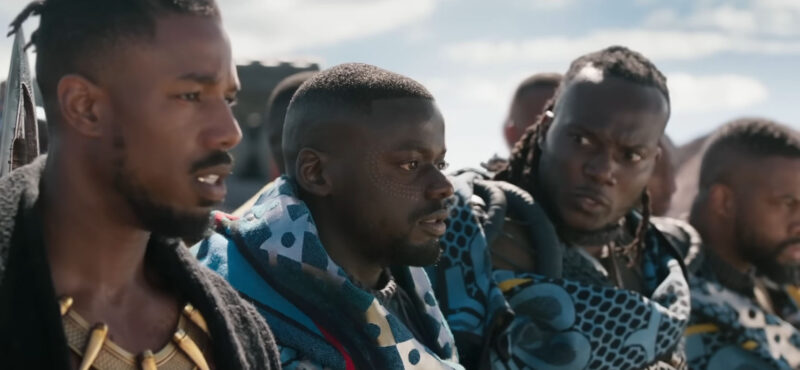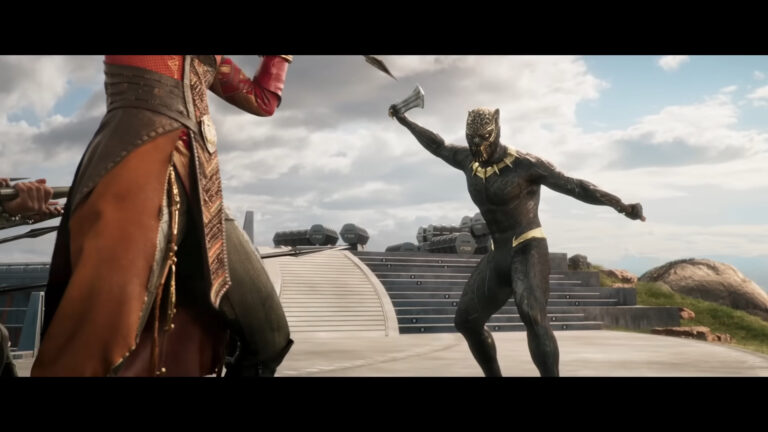“Black Panther” marked a significant milestone in Hollywood with its release, heralding a new era for representation in mainstream cinema.
It is a groundbreaking film that not only captivated audiences worldwide with its compelling story and stunning visuals but also became a cultural phenomenon, igniting conversations about:
- Race
- Identity
- Representation
By exploring these dimensions, we can understand the film’s legacy and the ongoing dialogue it has sparked about inclusion and representation in the entertainment industry.
Black Panther’s Breakthrough in Hollywood
“Black Panther” shattered long-held myths about the bankability of black-led films in Hollywood.
As the first Marvel film to feature a predominantly black cast, it was a bold statement against the industry’s historical biases.
The movie’s success was not just a commercial triumph, grossing $1.3 billion globally, but also a critical one, earning a nomination for Best Picture at the Oscars – a first for a Marvel film.
That opened doors for more diverse storytelling within the Marvel Cinematic Universe, influencing subsequent films to embrace more inclusive casts and narratives.
The film’s success demonstrated that audiences are eager for stories that reflect a broader spectrum of human experiences, encouraging Hollywood to rethink its approach to diversity and representation.
Cultural Representation and Perception Shift
“Black Panther” presented a revolutionary portrayal of Africa through its depiction of Wakanda, an African nation with advanced technology and sophisticated governance.
The representation challenged pervasive Western stereotypes of Africa as a continent defined by poverty and underdevelopment.
By showcasing a thriving, futuristic African society, the film sparked increased interest in African culture, tourism, and comic books.
- Related: Adapting novels to movies, what challenges are there?
It offered a powerful counter-narrative to traditional media depictions, contributing to a positive shift in how African heritage is perceived globally.
The film’s reception in Africa was overwhelmingly positive, resonating with audiences who saw themselves represented in a new, empowering light.
Hollywood’s Limited Perspective on Diversity

Despite “Black Panther’s” groundbreaking success, it highlighted the limitations of Hollywood’s approach to diversity.
The film’s representation of Africa, while progressive, was still filtered through a Western lens, focusing more on spectacle than on nuanced cultural depiction.
It underscores a broader issue within Hollywood, where the push for diversity often stops at superficial representation without genuine engagement with the cultures being depicted.
Hollywood audiences, therefore, might mistakenly believe that diversity issues have been fully addressed, while deeper, systemic changes remain necessary.
In contrast, industries like Nollywood offer more culturally integrated and engaged storytelling, highlighting the gap between Hollywood’s portrayals and authentic cultural representation.
The comparison calls for a reevaluation of how Hollywood approaches diversity, urging a move towards more meaningful and informed portrayals.
Criticism and Areas for Improvement
While “Black Panther” was a landmark achievement, it also faced criticism for not fully escaping Hollywood’s superficial approach to representation.
Critics argue that for true progress, Hollywood must move beyond surface-level diversity and engage more deeply with the political and social contexts of the cultures it portrays.
It requires more diverse voices in decision-making roles, ensuring that stories are told with authenticity and respect.
The film industry is called upon to foster genuine inclusivity, where representation is not just about numbers but about meaningful, nuanced engagement.
It involves creating opportunities for marginalized groups to shape narratives from within, rather than imposing external viewpoints.

